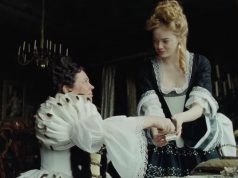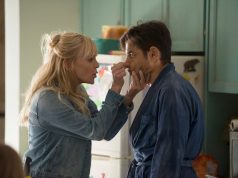Since her big break in “Scary Movie” eight years ago, Anna Faris has appeared in about a dozen comedies, usually as a ditzy blonde, a vain prima donna (she was a scene-stealer in “Lost in Translation”), or a combination thereof. And while the movies themselves have varied in quality, one thing has unified them: Anna Faris is always outstanding.
More people should be singing this woman’s praises. Like Goldie Hawn, to whom she has been compared, Faris can be sexy, funny, AND — and this is the rare part — sexy and funny at the same time. She’s physically beautiful, yet unafraid to perform wild acts of humiliating slapstick and general buffoonery. She has impeccable timing and natural comic instincts. Her failure to appear in many “respectable” comedies thus far is probably why she hasn’t become the superstar she deserves to be. I hope someone wises up and puts her in something brilliant.
In the meantime, there’s “The House Bunny,” an agreeable distaff comedy from the writers of “Legally Blonde” and “10 Things I Hate About You” that benefits immeasurably from Faris’ efforts. (She served as one of the film’s executive producers, too.) It was directed by Fred Wolf, who made this year’s lazy “Strange Wilderness,” and produced, believe it or not, by Adam Sandler’s production company. It is a bizarre world we live in.
Faris plays Shelley, a Playboy Bunny exiled from Hefner’s mansion when she hits the ripe age of 27 (“59 in bunny years,” she’s informed), whereupon she wanders, despondent, onto a Los Angeles university’s Greek row and becomes house mother for a sorority of misfits. The seven Zeta girls are geeky, slovenly, sour, or in some other way different from the norm and thus cannot attract enough new pledges to keep their charter. Their leader, Natalie (Emma Stone), is a nerdy bookworm (“Why do everyone’s eyes glaze over when I talk?) who recognizes that Shelley is a boy magnet, and that if guys start hanging out at the Zeta house, girls will want to become Zetas.
You know the drill from here: Shelley teaches the girls how to break out of their shells and be more confident, and gives them fashion makeovers. (On using makeup: “We must highlight your eyes. The eyes are the nipples of the face.”) The girls teach Shelley how to relate to men in ways other than flirting with them. The sorority of mean girls down the street will try to thwart their plans, jealous of the Zetas’ newfound popularity, and the Zetas will accidentally become the vapid mean girls they used to hate before realizing their error and finding a happy medium between antisocial and shallow.
This ain’t exactly rocket science, and screenwriters Karen McCullah Lutz and Kirsten Smith have borrowed an awful lot from their “Legally Blonde” notes. Some plot threads are unnecessary (like the real reason for Shelley’s eviction), while others are underdeveloped (like Shelley’s romance with a brainy fellow, played by Colin Hanks, who only appears in a couple scenes). A few gags fall thunderously flat. And maybe it’s a little too convenient that all the misfit girls really just needed a makeover. (Is there no hope for the truly ugly?)
Yet there is still plenty of freshness in the delivery of these familiar elements, thanks not just to Faris but to her supporting cast of Zeta girls. Kat Dennings plays an easily offended sourpuss; Dana Goodman is the man-voiced trailer trash; “American Idol” runner-up Katharine McPhee plays a very pregnant loser; and Rumer Willis (Bruce and Demi’s daughter) is sweet, if not a naturally gifted actress, as a shy girl who wears a back brace.
And of course there’s Faris, too. I cannot overstate how much she adds to this film, from Shelley’s stupid-funny tics like growling people’s names to help herself remember them, to her inability to pronounce (or define) the word “philanthropy.” Shelley is a ditzy blonde who believes being a Playboy centerfold is the highest honor one can achieve, but she’s not mean, or even particularly shallow. She’s nice, she’s enthusiastic, she’s naive, and she’s clumsy — qualities that make her sympathetic. She’s someone we can laugh with rather than at.
The film looks at the fine line between making yourself likable and and being obsessed with your appearance. Everyone wants to be attractive, but how much emphasis should you place on it? This dichotomy is nicely encapsulated in the scene where Shelley suggests they hold a car wash to raise money. “Wash this car, you sexy b****es!” she calls to the girls. The easily offended one says, “Did she just call us b****es?,” and one of the others says, hopefully, “Did she just call us sexy?”
The lesson, eventually, is that it’s only bad to be sexy if that’s ALL you are. There’s nothing wrong with changing your hairstyle and clothing to make yourself feel more confident, and there’s nothing wrong with wanting to be appealing to the opposite sex. You just have to be yourself, too, and discover the balance between being popular and being fake. I would argue that “The House Bunny” offers more actual empowerment and inspiration to young women than “Sex and the City” or “Mamma Mia!,” two films that pretended to espouse feminist ideals but that were ultimately shallow and antiquated. And it’s a lot funnier to boot.
B (1 hr., 37 min.; )





